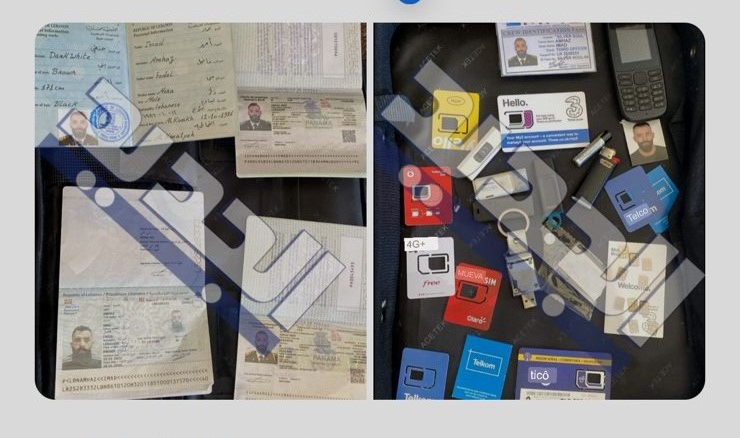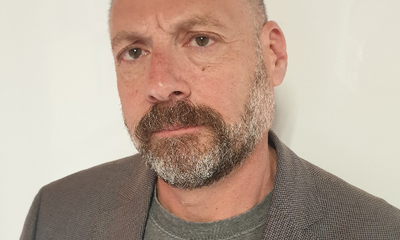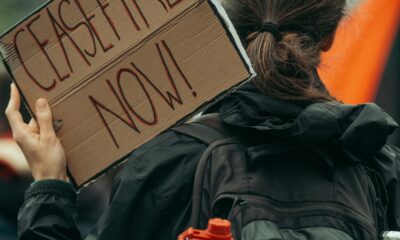
News

Hezbollah leader’s SA SIM cards ring alarm bells
After Israel captured senior Hezbollah naval operative Imad Amhaz in an unprecedented raid in the early hours of 1 November, Lebanese forces published photographs of 10 SIM cards with foreign numbers, a phone, and foreign passports found in his accommodation.
In the image, at least two Telkom SIM cards and one MTN SIM card are clearly visible, raising questions about Amhaz’s ties to South Africa.
“What it proves is that Hezbollah does have a presence here in South Africa,” says Dr Hussein Solomon, who has written extensively about terrorist organisations and their global operations. “There have been several incidents where people possessed SIM cards in South Africa which weren’t registered according to the Regulation of Interception of Communications and Provision of Communication-Related Information Act [RICA], despite this being mandatory.”
Steven Gruzd, the head of African governance and diplomacy programme at the South African Institute of International Affairs, says, “This development is extremely concerning as it suggests some South African involvement with this operative. There are already huge concerns about how porous our borders are and how relatively easy it is to acquire South African passports, ID cards, and drivers’ licenses fraudulently.
“We have been greylisted for deficient anti-money laundering laws and practices,” Gruzd says. “We now need visas to go to the United Kingdom due to failure in the security of South African documents. We shouldn’t forget the terrorist dubbed the ‘White Widow’ – Samantha Lewthwaite – had fraudulent South African documents.”
Dr Glen Segell, who has written about terrorism in Africa, says the presence of the South African SIM cards “could mean that many services that require a local number would be open to Amhaz – for example South African banking or government services. Clearly, he wanted a South African connection and a South African number. The question is if the number was in his name. As we know, SIM numbers need RICA in South Africa. That requires South African ID [green book or card], passport [local or foreign], or refugee document, and proof of residence.”
Another possibility is “maybe people calling him would think he is in South Africa”, says Segell. “Companies have international roaming, so the call would forward to wherever he is. He could also have a South African WhatsApp number. Maybe it was important that people thought he was in South Africa, or associated with it. Maybe it also means that anyone monitoring others [terrorists] in South Africa would think less if the person called a South African number. However, if they called a Lebanese number, this would more likely raise suspicions. So, the focus might be to reduce suspicions on others, maybe even from elsewhere in Africa.”
Institute for Security Studies Senior Training Co-ordinator Willem Els says, “It’s an open secret that South Africa is a haven for terror funding, hence the Financial Action Task Force [FATF] greylisting. The fact that Amhaz was in possession of a South African-registered SIM card serves as proof of South African ties and possible support. If he were able to use the SIM card, it should have been activated with an ID number, address, and so on. That would provide valuable information about who his support structure is back in South Africa.”
Ryan Cummings, the director of Signal Risk, which specialises in country risk analysis on the African continent, says, “The presence of a Hezbollah commander in South African territory would not be overly surprising. South Africa has long served as a key transit hub and gateway for transnational extremist organisations who use our borders as a means to plan, finance, and facilitate activities abroad.
“In fact, Hezbollah was deemed to have been a possible sponsor of the Qibla movement in South Africa, which was said to have assumed a leadership role in the PAGAD [People Against Gangsterism and Drugs] civic movement in the 1990s,” says Cummings. “This then resulted in PAGAD shifting its focus from gangsters and drug dealers to include attacks on the country’s Jewish community and American commercial interests.
“At this stage, it’s difficult to glean specific information regarding what the possession of the MTN and Telkom SIM cards mean for the Hezbollah commander’s connections to South Africa,” he says. “He may have been able to have acquired the SIM cards both inside and outside of South Africa, given that both telecommunication services are available outside of South African borders.”
Says Solomon, “If Amhaz was involved in criminal activities or money laundering in South Africa, it would make it harder for South Africa to get off the FATF grey list, especially in light of South Africa, according to the United Nations, being a financial conduit for Islamic State activities across the African continent.”
Els notes that “South Africa is under pressure with the FATF, and the listing may be extended to 2026 as it struggles to meet all the immediate outcomes. They are investigating more than 20 terrorist financing cases at present, and this will place some further pressure on it.”
Cummings thinks that this particular incident’s actual impact on the FATF greylisting “would be minimal unless there’s evidence that the individual in question was exploiting South African financial and banking services for terrorism funding or money laundering”.
In Solomon’s book, Jihad: A South African Perspective, published in 2013, he looks at Hezbollah’s presence in South Africa, especially in regard to criminal activities and military training. For example, Hezbollah established the Karbala Liberation Front in Johannesburg, which sent money to Hezbollah in Lebanon. As early as 1996, Israel lodged a formal complaint with the South African government regarding the existence of five Hezbollah training camps in South Africa.
“In recent years, there has been growing evidence that South Africa is increasingly playing a key supportive role in global jihad networks – from the provision of safe houses, to the movement of funds, to the provision of identity documents to terrorists, and reports of paramilitary camps providing training to local recruits,” wrote Solomon.
Some media reported that Amhaz’s family had told them that the 10 SIM cards were collected and maintained by him to “keep in touch with his family in any of the countries he visited”.
Several British media outlets surmised that Amhaz was a double agent spying for Israel, and that the operation was a rescue mission, which might explain why Israel left behind items like the SIM cards and foreign passports. Els agrees that “it was an oversight of the Israelis not to gather these items as they would have been a trove of information”.











Nazlee Jeppie
November 11, 2024 at 2:32 pm
And Jewish South Africans served in the IOF. The kettle calling the pot black.
Nadia fieliea
March 26, 2025 at 6:37 am
Its actually laughable when terrorist countries call others terrorists. America the worst of it all. The father of terrorism. I think they probably forgot Hiroshima nuclear drop off. Aiding and abetting terrorists. So when some muslim or black country defends itself their media propaganda platforms are forced to propogate blasphemy to fool and deceive the world. In the same time taking all the strain off feom the real terrorists. How many african countries were terrorised and brutally killed for their resources and then propagated off as defending the helpless people. America, israel france britain ect. And yet they call us terrorists. Cheap tactics because most people are still in slumberland.the west kills for the sheer pleasure of it and yo enhance and enrich themselves. They became filthy rich off the blood of innocent people. Their hands have more blood on it than any other country. Worse than the muslim countries. And lastly war started way before islam came into existence. The jews started their own filthy war between 2 brothers Jereboam and rehoboam. So they can go blame themselves for their pathetic situation they find themselves in. Yes God favoured them until they turned on God and thought themselves to be a “God”. They brought their own bad luck on themselves. And after that the Romans too hated them. So did the greeks, germans ect. Why because hitler said everywhere they come they just want to take over. So its in thwir nature then they want to cry victim. They condemned Jesus and his mother and was part of his killing. So yeah their hands are not clean. In fact they should start by getting a cleaning agent if their ever is one. And never forget Trump,s genetic genes hails from German bloodline. The same germans that killed them jews. So all these leaders are brutal terrorist killers and murderers. They can all go to hell. Sorry forgot they already own hell too. Without america Iarael is a mere puppet. And will never be able to hold their fort. They are only powerful because of its allies. Joke of the day. Hamas supposedly has 20 000 fighters and yet israel cannot even destroy them. Let alone america. What a pathetic joke they are. They,ve been doing it since time memorial and cannot even get rid of them. Yet they boast the worlds best military. Hahahahaaa